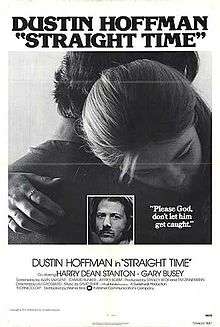Straight Time
| Straight Time | |
|---|---|
 Theatrical release poster | |
| Directed by | Ulu Grosbard |
| Produced by |
Stanley Beck Tim Zinnemann Uncredited: Dustin Hoffman |
| Screenplay by |
Alvin Sargent Edward Bunker Jeffrey Boam Uncredited: Nancy Dowd Michael Mann |
| Based on |
novel No Beast So Fierce by Edward Bunker |
| Starring |
Dustin Hoffman Harry Dean Stanton Gary Busey Theresa Russell M. Emmet Walsh Kathy Bates |
| Music by | David Shire |
| Cinematography | Owen Roizman |
| Edited by |
Sam O'Steen Randy Roberts |
Production company |
First Artists |
| Distributed by | Warner Bros. |
Release dates |
|
Running time | 114 minutes |
| Language | English |
| Box office | $9,900,000[1] |
Straight Time is a 1978 American crime drama film directed by Ulu Grosbard, starring Dustin Hoffman, Theresa Russell, Gary Busey, Harry Dean Stanton, M. Emmet Walsh, and Kathy Bates.
Plot summary
Max Dembo (Dustin Hoffman), lifelong thief, is released from a six-year stint in prison and forced to report to a boorish and condescending parole officer, Earl (M. Emmet Walsh).
One of the conditions of parole is that Max finds a job. At the employment agency, he meets Jenny Mercer (Theresa Russell), who helps him land scale-wage work at a can factory. Jenny accepts his invitation to dinner, where it's clear that she is smitten by this worldly and seemingly gentle ex-con.
Earl pays a surprise visit to Max's room, finding a book of matches that Max's friend Willy (Gary Busey) recently used to cook heroin. Although Max clearly has no track marks or other signs of drug abuse, he is handcuffed and dragged back to jail, out of a job and a home. Jenny visits him and gives him her number to call when he gets out.
After blood tests prove he's clean, Max is picked up by a smug Earl, who feels he actually gave Max a break by not pursuing the fact that someone had been using drugs in his place of residence, which would result in three more years in prison. During their car ride to a halfway house, Earl pushes Max to name the user. Max, realizing he will never get a break, pummels Earl, takes control of his car, and handcuffs him to a highway divider fence with his pants around his ankles.
This stunt now makes straight life impossible. Max returns to a life of crime, robbing a Chinese grocery store and planning bigger heists with some willing old accomplices. After successfully robbing a bank together, Max and his friend Jerry (Harry Dean Stanton) decide to up the ante and clean out a Beverly Hills jewelry store. The job is botched when Max takes too long in trying to steal everything. Willy, acting as getaway driver, panics and takes off, leaving Max and Jerry to flee on foot as police converge on the store.
Jerry is shot and dies, while Max shoots a police officer. Max escapes with the loot, settles the score with Willy by killing him, and escapes L.A. with a loyal Jenny by his side. Outside the city limits, though, Max has second thoughts as to their prospects on the lam. He decides to leave Jenny at a gas station for her own good, telling her he will be caught no matter what as he drives away.
Cast
- Dustin Hoffman as Max Dembo
- Theresa Russell as Jenny Mercer
- Gary Busey as Willy Darin
- Harry Dean Stanton as Jerry Schue
- M. Emmet Walsh as Earl Frank
- Rita Taggart as Carol Schue
- Kathy Bates as Selma Darin
- Sandy Baron as Manny
- Jake Busey as Henry Darin
Production
The screenplay was written by Alvin Sargent, Edward Bunker and Jeffrey Boam, based on Bunker's novel No Beast So Fierce. Dustin Hoffman was the director of the film when shooting began, but ultimately decided to give up that role, resulting in Grosbard being hired.[2][3]
This film introduced both Gary Busey and his seven year old son Jake; Theresa Russell; and Kathy Bates. Busey went on to earn an Academy Award nomination for Best Actor as the lead in The Buddy Holly Story. Russell’s film career includes roles in Impulse and Whore. Bates would win the Academy Award for Best Actress and a Golden Globe, playing deranged nurse Annie Wilkes in the Rob Reiner film Misery, as well as thirteen Emmy award nominations for her work in television.
Film location
Filmed at Burbank Studio, California. (Ref: Film Credits)
References
- ↑ "Straight Time". Box Office Mojo.
- ↑ Foden, Giles (March 2, 2012). "The Tao of Hoffman". The New York Times. Retrieved January 18, 2013.
- ↑ Knight, Chris (January 18, 2013). "Actor-turned-director Dustin Hoffman on the 'awesome' experience of making Quartet". The National Post. Retrieved January 18, 2013.
External links
- Straight Time at the Internet Movie Database
- Straight Time at Rotten Tomatoes
- Straight Time at AllMovie